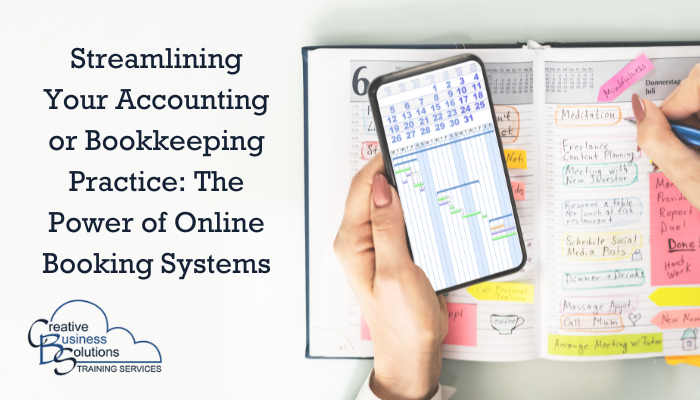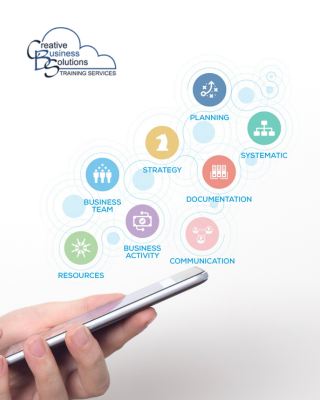
In the fast-paced world of accounting and bookkeeping, efficiency and effectiveness are crucial for staying competitive and meeting client needs. The demand for streamlined processes continues to grow; the introduction of online appointment booking systems has revolutionized how accounting and bookkeeping practices operate.
These systems offer a modern solution to the challenges faced by accounting professionals. They specifically address issues such as double-booked appointments, missed appointments, and the time-consuming nature of manual appointment scheduling. By integrating with your other systems, these solutions provide a comprehensive approach to client management and operational efficiency, saving time and reducing errors.
Understanding the potential of online appointment booking systems is essential for maximizing productivity and delivering exceptional service in the digital age. With these systems, you have the power to manage your appointments with ease and efficiency.

Current Challenges in Accounting and Bookkeeping Practices
Accounting and bookkeeping practices often face challenges when booking and following up on client appointments. Traditionally, this process involved manually scheduling appointments through phone calls or emails, which could be time-consuming and prone to errors. Additionally, keeping track of appointments and reminding clients about them takes time, leading to missed appointments and scheduling conflicts.
Accounting professionals commonly need help with issues such as double-booked appointments, missed appointments, and the time-consuming nature of manual appointment scheduling. The traditional method of using paper calendars or essential digital calendars has limitations in terms of real-time updates, accessibility, and the ability to send automated reminders.
A modern solution that streamlines the appointment booking and follow-up process for accounting professionals is needed. A modern solution could involve using specialized appointment scheduling software that integrates with other systems.
This software could offer features like online appointment booking, automated reminders, calendar synchronization, and client management capabilities. By adopting such a solution, accounting professionals can take control of their time, reduce scheduling errors, and provide a more convenient experience for their clients.
Understanding Online Booking Systems
Understanding online booking systems is crucial for businesses in many industries. An online booking system is a software application that enables customers to conveniently book and pay for services, appointments, or reservations through a website or mobile app.
The functionality of online booking systems typically includes the ability to view available time slots or resources, select specific dates or times, and complete the booking process online. These systems also often provide automated email notifications and reminders to both customers and businesses, along with the option to reschedule or cancel bookings.
Different online booking systems are available, ranging from simple appointment scheduling tools to comprehensive booking and management platforms designed for specific industries such as hospitality, healthcare, or tourism. Additionally, industry-agnostic booking systems can be customized to suit various businesses.
Using an online booking system has numerous benefits. Businesses can streamline their booking processes, reduce administrative work, minimize the risk of overbooking, and offer 24/7 accessibility to customers.
Furthermore, online booking systems can improve customer experience, increase operational efficiency, and provide valuable data and insights for business analysis and decision-making.

Enhancing Efficiency with Online Booking Systems
An online booking system can significantly improve efficiency by simplifying appointment scheduling, automating client communication and reminders, and optimizing resource allocation and time management.
Firstly, online booking systems streamline appointment scheduling by allowing clients to book appointments at their convenience without needing phone calls or emails. This independence saves clients time and reduces the administrative burden on staff who would otherwise have to schedule appointments manually. The system can also prevent double bookings and help manage real-time appointment availability, leading to a more organized and efficient schedule.
Secondly, automated client communication and reminders are key features of online booking systems that can significantly improve efficiency. By sending automated confirmations, reminders, and follow-ups via email or text, the system not only reduces the likelihood of missed appointments but also keeps clients informed and engaged throughout the appointment process. This automation saves staff time and improves client satisfaction, enhancing the overall client experience with the practice.
Furthermore, an online booking system optimizes resource allocation and time management by providing valuable insights into appointment patterns and staff availability. This feature allows businesses to allocate resources more effectively, ensuring that staff members are utilized optimally and that appointments are evenly distributed. Additionally, by providing real-time visibility into appointments and staff schedules, the system enables better planning and minimizes idle time, ultimately improving overall productivity.
In conclusion, an online booking system enhances efficiency by simplifying appointment scheduling processes, automating client communication and reminders, and optimizing resource allocation and time management. These features save time, reduce administrative burden, and contribute to a more organized, productive, and client-friendly appointment experience.

Improving Effectiveness Through Online Booking Systems
Online booking systems play a crucial role in enhancing client experiences and satisfaction with accounting or bookkeeping practices. Allowing clients to book appointments online at their convenience significantly improves overall accessibility and satisfaction levels.
Moreover, these systems facilitate better organization and planning for the practice by streamlining appointment scheduling processes and automating client communication and reminders. By improving client experiences, online booking systems help accounting professionals feel more connected to their clients.
In summary, implementing an online booking system enhances the client experience, facilitates better organization and planning, and enables data-driven decision-making for accounting or bookkeeping practices.
Implementation and Best Practices
Implementing an online booking system in an accounting or bookkeeping practice can greatly streamline appointment scheduling processes, improve client communication, and enhance resource allocation and time management.
To successfully implement an online booking system, several key steps must be followed, including careful selection of a system that meets the practice's needs, integration into the existing workflow, and promotion among clients. Clear communication, training, and support are also crucial for overcoming challenges and resistance to change.
Firstly, it's essential to carefully select an online booking system that aligns with the specific needs of the accounting or bookkeeping practice. The system should be user-friendly for both clients and staff and offer necessary features such as calendar integration, client reminders, customization options, and reliable customer support.
After choosing the system, the next step is integrating it into the existing workflow. This step involves training staff to use the system effectively, updating the practice's website and social media with the new booking options, and communicating the change to existing clients.
To maximize its benefits, it is important to promote the use of the online booking system among clients. This can be done through targeted email campaigns, social media posts, and in-person reminders during client interactions. By emphasizing the convenience and accessibility of online booking, clients will feel valued and catered to, encouraging them to adopt the new system.
Challenges and resistance to change may arise during the implementation process. To overcome this, it's crucial to clearly communicate the benefits of the online booking system to staff and clients. Addressing concerns, providing ample training and support, and being open to feedback can help smooth the transition.
Additionally, regularly seeking feedback from clients and staff after the implementation can uncover any issues or areas for improvement. This continuous improvement approach can ensure that the online booking system continues to meet the needs of the accounting or bookkeeping practice and its clients.
By following these steps and best practices, an accounting or bookkeeping practice can successfully implement an online booking system, maximize its benefits, and overcome potential challenges and resistance to change.


























